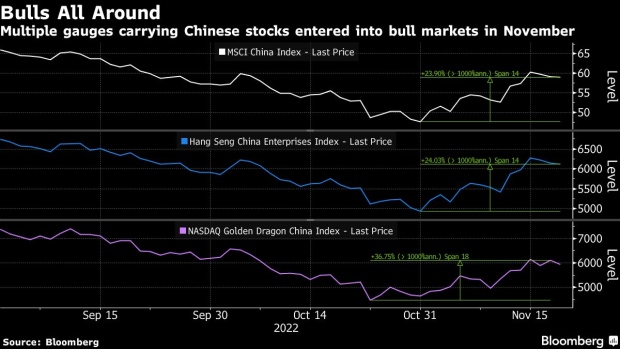Nov 20, 2022
China Stocks to Jump on Reopening and Property: Hao Hong
, Bloomberg News

(Bloomberg) -- China will reopen from its Covid Zero lockdowns gradually and its property sector will recover slowly with policy support, helping propel the country’s benchmark stock index by 13% in the next 12 months, according to Hao Hong, chief economist at GROW Investment Group.
Stocks in Hong Kong may jump as much as 28% in the next year, Hong said in his report Monday titled “Outlook 2023: A Cyclical Recovery.”
The benchmark Shanghai Composite may trade between around 3,000 to 3,500 during that period, Hong wrote. The Hang Seng Index likely to jump to around 23,000 at most, while 15,000 is seen as low point of current cycle, he said.
Hong’s comments echo those on Wall Street, with banks including Morgan Stanley and JPMorgan Chase & Co. recently raising their targets for China’s stock gauges. Among the factors prompting increased bullishness: a relaxation in rigid Covid controls, an increase in liquidity for the nation’s battered real estate sector and the potential for an improvement in relations with the US.
“It is not a question of whether China will reopen, but a question of over how long a period and how best to manage to minimize healthcare costs and potential lives lost,” he said.
Hong’s base-case scenario is a gradual China reopening from Covid Zero at 80% odds, a slow recovery in the country’s property markets, at the same odds, and a US recession in 2023. Stock gains will be higher should any of these contingencies be better than expected, he said.
“Of course, the risk is China stays a hermit, property continues to ail, and a US recession. Such triple whammies would render a risk scenario similar to what we have been through in 2022 – no need to elaborate further,” he wrote.
Hong also predicted that cyclical sectors, including industrials, materials, discretionary, property and infotech, may outperform.
Hong was a former China strategist at Bocom International Holdings Co. before he resigned following bearish reports on the country.
(Adds comment in fifth paragraph. A previous version was corrected to change the percentage change in the first paragraph)
©2022 Bloomberg L.P.





